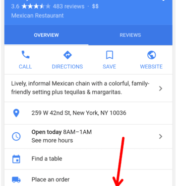
Local SEO services are vital to smaller businesses that operate on a provincial, as opposed to a country, level. While national SEO pays attention more to ranking in searches across the nation, local SEO prioritizes appearing on SERPs in a precise location. This method depends on marketing your business, products, and services to local leads and customers.
Optimizing your local SEO implies more website traffic, leads, and business creation as the approach is more appropriate to your base of local customers. Think of this strategy as a way to assist you compete more efficiently against larger national brands that have limitless resources to spend. By concentrating on exact local-SEO to-dos, you can nullify the advantage of bigger brands that regularly optimize for wider keywords and depend on brand recognition, instead of value propositions, to fetch traffic.
Here are the top few ways you can make your local SEO successful.
- Create and Optimize Your Google My Business Account
To begin, you need to claim your business on Google My Business. This forms your presence, for free, on the search engine, and it means your business will also display on Google Maps. Not only will your business show in search results on all devices, but also, if Google validates your business as genuine, it could also surface in the appreciated sidebar space of a Google search.
- To optimize Google My Business, ensure that you:
- Verify your listing
- Provide exact and up-to-date information
- Include your logo, acceptable payment methods, hours of operation, the product or service you sell, and ample images
- Boost your customers to review your business online
- Respond openly to customer reviews
- Create content within your account with Google Posts
Get Regular Reviews from Happy Customers
Getting your customers to write positive reviews for your business doesn’t just improve your Google My Business presence; it also boosts more local customers to buy from you.
Here are some tips to encourage customers to leave reviews:
- Request for a review in person after the close of a sale
- Send a post-purchase email or text asking customers to post a review
- Respond to current reviews in a professional way, thanking reviewers and addressing complaints in not-so-positive reviews
Optimize for Voice Search
Voice search will expand rapidly in the coming years. So, in local SEO, it’s necessary to optimize for how people ask questions when they speak into devices, as opposed to how they type out their searches.
Basically, your customers use more long-tail keywords when doing voice searches related with regular search. Due to this, you’ll also have to regulate the SEO of your content to fit the more conversational tone of someone speaking.
It’s also critical to consider user intent when optimizing for voice, as these searches are most often achieved when the user needs a precise piece of information. If they’re baking and ask Alexa to convert tablespoons to cups, they’re expecting a fast and useful answer. If a potential customer uses voice search to ask what your business’s hours are, this info should also be readily available.
Create Content Based on Local News Stories or Events
There’s nothing quite like authoring content that speaks or narrates directly to a local issue to grasp your local customers’ attention.
Some approaches include:
- Writing blog posts around local activities, news stories, or events
- Creating videos about local donations or causes that your business supports
- Setting up location-precise webpages on your website with first-class local content if you serve diverse parts of a region
These are a few useful local SEO tips by digital marketing experts. We are sure you will benefit from these if implemented properly.


